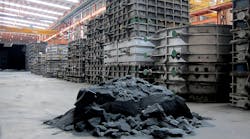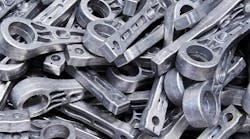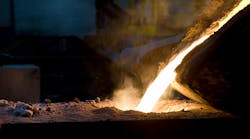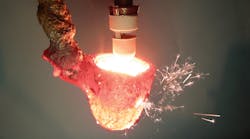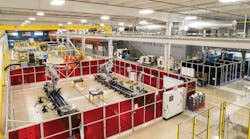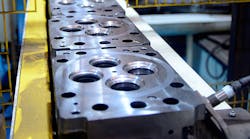Tupy S.A. will update and increase its compacted graphite iron capacity at Saltillo, Mexico, in order to increase capacity for CGI cylinder blocks for passenger cars, to fulfill a new order from an unnamed automaker. To do this, Tupy has contracted SinterCast AB to update the SinterCast System 3000 Plus system installed at that operation.
“The new CGI cylinder block (production program) will result in high-volume CGI series production on five different molding lines at Tupy, further reinforcing our global leadership position for CGI product development and series production,” according to Luiz Tarquínio, Tupy president and CEO.
Tupy produces cast-iron cylinder blocks and heads for multiple automakers and commercial vehicle engine manufacturers, including Audi, Cummins, Daimler, Ford, and several others. Though headquartered in Brazil, it has been operating in Mexico since 2011.
CGI is a specialty grade of cast iron that has greater tensile strength, stiffness, and fatigue strength than gray iron or aluminum. It is increasingly popular with diesel and gas engine manufacturers seeking to reduce weight, noise, and emissions for their designs.
SinterCast is the developer and licensor of the most widely used production and process control technology for CGI, and Tupy is among it largest customers.
According to SinterCast, Tupy will update the CGI system supplying Saltillo’s heavy-duty Molding Line 4 to the full System 3000 Plus standard. Line 4 is capable of molding passenger vehicle and heavy-duty engine components.
“In order to support the growing demand for medium- and heavy-duty on-road CGI programs in North America, we initially installed SinterCast-CGI capability on Line 4 at our Saltillo facility, in 2012, to support the product development requirements of our customers. Now, as those development efforts have led toward a new, high-volume series production order and intensified pre-production support, we are pleased to upgrade to the fully automated System 3000 Plus standard,” Tarquínio noted.
System 3000 Plus, the current benchmark for SinterCast process control, automatically controls base treatment, process control measurement, and the final optimization of magnesium and inoculant prior to casting.
“The System 3000 Plus upgrade has been designed from a clean sheet of paper, incorporating Tupy’s high-volume CGI production experience in Brazil and Mexico, and taking advantage of the latest technology in every aspect of the foundry process,” stated SinterCast president and CEO Dr. Steve Dawson.
“Together, Tupy and SinterCast have ushered more than 25 CGI programs from the product development phase into series production,” according to Dawson. “We are pleased that this track record of reliability and success has led to another series production commitment, and to our fifth high-volume series production installation at Tupy.”

